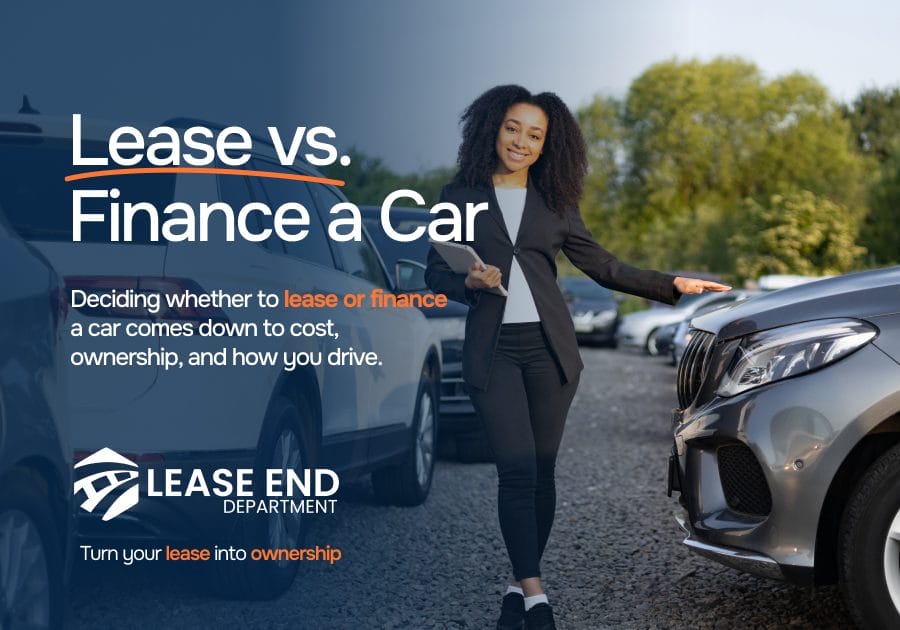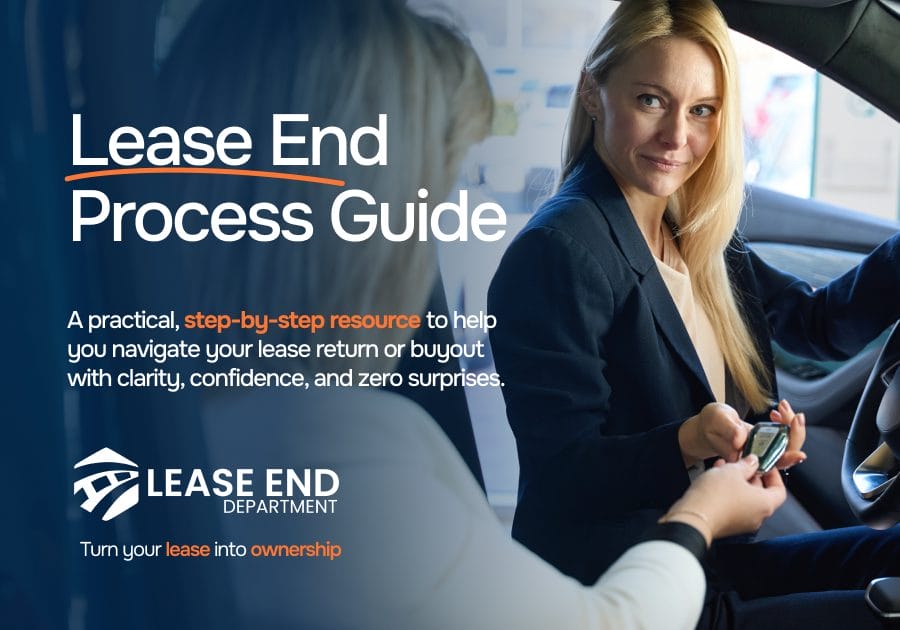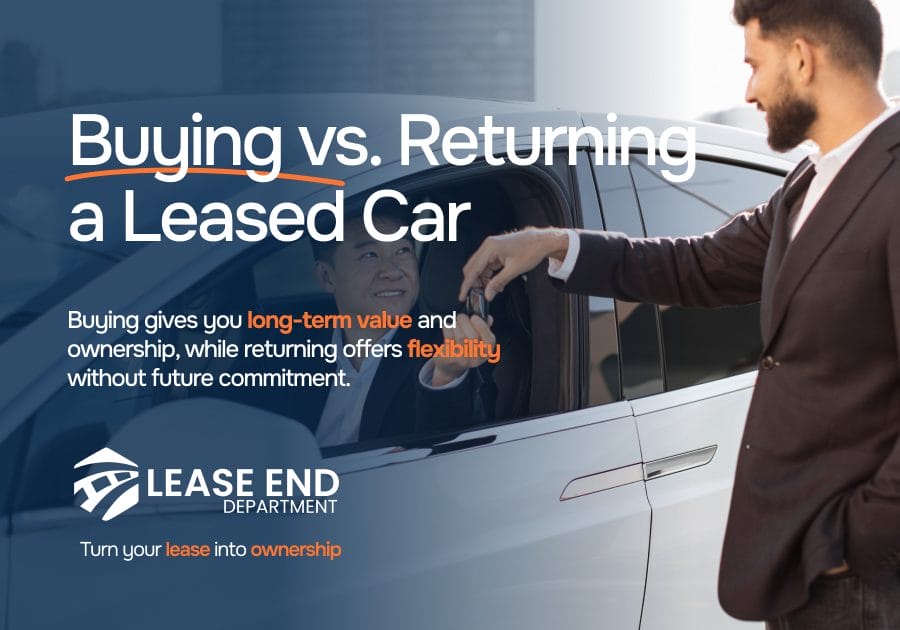Leasing or Financing a Car: Key Takeaways
- Leasing typically means lower monthly payments, but it’s essentially a form of renting. You’ll face mileage limits, and you won’t build ownership
- Financing means buying the car over time. It’s a bigger up-front cost, but once it’s paid off, the vehicle is entirely yours, which gives you more flexibility in the long run
- Lease payments only cover depreciation, while finance payments go toward full ownership
- Looking to keep your leased car? If it’s worth more than the residual value, buying it out could save you money, especially with lease buyout financing
- Leasing is great if you like to upgrade every few years. Short-term plans, low mileage, and a taste for new tech? Leasing might be a good fit
- Insurance requirements vary. Leased cars usually need gap coverage. With financing, you still need full coverage, but lenders often allow more flexibility
In 2025, over 26% of new vehicles in the U.S. were leased; however, most drivers are still unsure whether it’s better to lease or buy.
Each option has advantages, as what looks cheaper now might cost more later, depending on how you drive and how long you plan to keep the car.
Leasing usually means lower monthly payments and less commitment, while financing helps you build ownership and avoid mileage limits.
Not sure what makes the most sense for your lifestyle? That’s normal; most drivers aren’t 100% certain either.
In this guide, you’ll learn:
- The key differences between leasing and financing
- How monthly payments and costs compare
- The pros and cons of each approach
- When one option clearly wins over the other
- How Lease End Department helps you choose with confidence
Key Differences Between Leasing and Financing
Leasing and financing both let you drive a car, but the way they work and what you get out of them, is very different.
When you lease, you rent the car for a set period, typically ranging from 24 to 36 months. You don’t own the vehicle, and you’ll return it unless you choose to buy it out at the end.
When you finance, you’re buying the car with a loan. You make monthly payments toward full ownership, and once the loan is paid off, the vehicle is yours to keep, sell, or trade as you see fit.
Here’s how they compare in more detail:
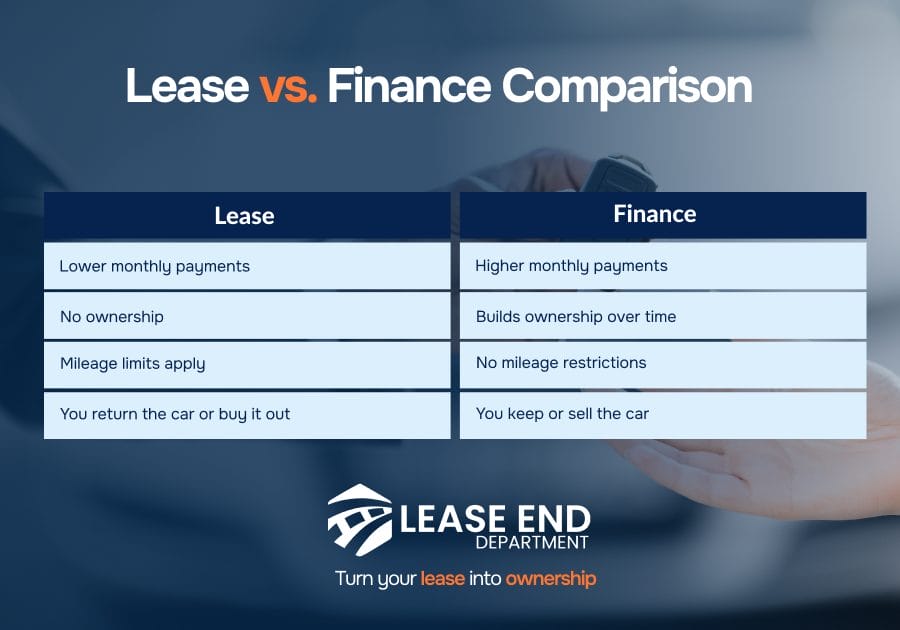

Pros and Cons of Leasing a Car
Leasing can be a smart option if you want a newer car with lower monthly payments, but it may not be the right fit for everyone.
Here is our comparison in a short pros & cons overview:
Pros of Leasing
- Lower monthly payments than financing
- Leasing lets you enjoy new models every few years without being tied down for the long haul
- Minimal maintenance, as most leases end before major repairs are needed
- Smaller upfront costs, often just the first month’s payment and fees
- No hassle of resale as you can just return the car at lease-end
Cons of Leasing
- You do not gain ownership since you are paying to borrow, rather than building equity.
- Mileage limits that are typically 10,000 to 15,000 miles per year
- Fees for wear and tear or exceeding mileage limits
- Early termination penalties if you need to exit the lease early
- You must lease or buy again at the end, no payoff without action
Pro tip: Leasing is best for short-term needs and low-mileage drivers who value flexibility and the latest features, without the burden of long-term ownership.
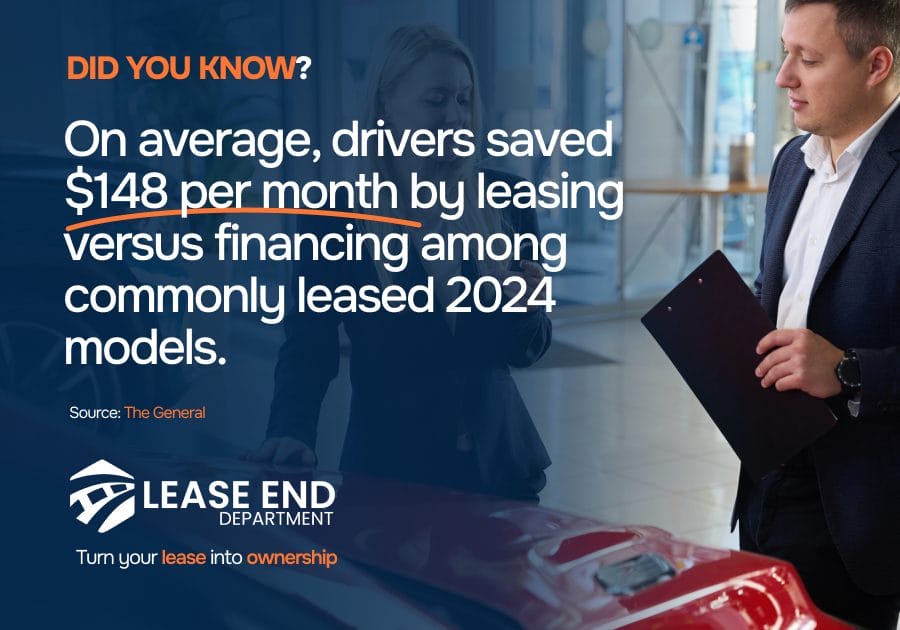

Pros and Cons of Financing a Car
Financing gives you the path to ownership, and that comes with both long-term advantages and a few financial trade-offs.
The same way we compared leasing, here are the pros & cons for financing:
Pros of Financing
- You own the car once the loan is paid off
- No mileage limits or wear-and-tear fees
- Can build equity if the vehicle holds its value
- Freedom to modify, sell, or trade at any time
- No more payments once the loan is done
Cons of Financing
- Higher monthly payments compared to leasing
- Longer loan terms that are usually 48 to 72 months
- More upfront costs, including down payment and taxes
- Responsible for repairs and maintenance after the warranty ends
- Depreciation risk, where the car may lose value faster than you expect
Pro tip: Financing is a smart move if you plan to keep the car for several years and want the freedom to use and maintain it on your terms.
Lease vs Finance: What Makes More Sense
Deciding between leasing and financing often comes down to your driving habits, budget, and long-term goals.
Here’s a simple way to think about which path fits your lifestyle best:
Leasing might be better if:
- You drive fewer than 12,000 miles per year
- You like upgrading vehicles every few years
- You want a lower monthly payment
- You’d rather not deal with long-term maintenance or repairs
Financing might be better if:
- You plan to keep the car for five or more years
- You want to build equity and eventually own the car
- You drive a lot and don’t want mileage restrictions
- You view the car as an asset you might resell later
Let’s say your lease is ending, and the buyout price is $17,000. You check the market and realize your car is worth $20,500; buying it could save you thousands of dollars.
In today’s used car market, smart buyouts are more common than you think. If your car is well-maintained and has a low residual value, buying it could be a smart move.
Helpful tip: If your priority is staying under budget month to month, leasing offers a lighter load, and lets you change things up every few years.
How Lease End Department Helps You Make the Right Move
Still deciding whether you should lease vs. finance a car?
At Lease End Department, we help drivers compare both decisions side by side, without dealership pressure or confusing terms.
If you’re nearing the end of a lease or planning to buy out your current vehicle, our team can help you compare the numbers, unlock your options, and move forward with confidence.
Not sure which way to go? Look at what we offer:
- Personalized lease and finance guidance: Skip the dealership back-and-forth and go straight to what works for you
- Buyout loan pre-approvals: If you’re considering keeping your lease, we offer fast financing that skips the dealership
- 100% online process: From title transfer to plate delivery, everything is handled for you, no showroom trips required
Why Lease End Department? Because you need a reliable partner when choosing between leasing and financing a car. The process should be clear, simple, and built around your goals.
Lease vs Finance a Car: FAQs
What is leasing a car vs financing it?
Leasing means paying to use a car for a set term, typically two to three years, without owning it outright. Financing means taking out a loan to buy the car and gaining full ownership once the loan is paid in full.
What’s the main difference between leasing and financing a car?
The key difference is ownership. Leasing is a temporary arrangement that doesn’t build equity. Financing leads to full ownership once the loan is paid, which can offer better long-term value.
Is leasing a car a good idea compared to financing?
Leasing can be an innovative option if you want lower monthly payments, fewer long-term commitments, and prefer driving new cars. Financing is better if you plan to keep the car for many years and want to build ownership.
What’s better: lease or finance for a first-time car buyer?
It highly depends on your priorities. Leasing may offer a lower initial cost and access to newer vehicles, while financing builds long-term value. First-time buyers with stable income and low mileage needs may prefer leasing.
Do lease and finance agreements affect insurance differently?
Yes. Leased vehicles often require higher insurance coverage, including gap insurance. Financed vehicles also need full coverage but may offer more flexibility depending on the lender.
What happens if you finance a car instead of leasing it?
If you finance, you’re committing to owning the car. You’ll pay higher monthly payments compared to leasing, but once the loan is paid off, you have full ownership and no more payments.
Can you lease a car and then finance it later?
Yes. Many drivers choose to buy out their lease at the end by financing the remaining value of the vehicle. This is common if the car is in great shape or worth more than the buyout price.
Can I negotiate the lease buyout price?
Sometimes. While most lease buyout prices are fixed in your contract, you may have room to negotiate if the car’s market value is lower than the residual value or if you’re buying out early. It never hurts to ask.

